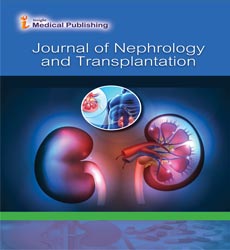Effects of COVID-19 on Nephritis
Johnny Saremirad*
Department of Nephrology, Stanford University, Sousse, Tunisia
- *Corresponding Author:
- Johnny Saremirad
Department of Nephrology,
Stanford University,
Sousse,
Tunisia,
E-mail: johnnysaremirad@gmail.com
Received Date: October 07, 2021; Accepted Date: October 13, 2021; Published Date: October 27, 2021
Citation: Saremirad J (2021) Effects of COVID-19 on Nephritis. J Nephrol Transplant Vol.5 No.4:001
Description
This overall diagnosis associated with COVID-19 contributes significantly to the global weight of kidney disease in terms of human distress and the cost of the clinical framework. It is estimated that more than millions of people on the world are experiencing the side effects of kidney diseases. This makes kidney disease is one of the most common infectious diseases in the world. The kidneys are susceptible to environmental pollutants because most environmental toxins are concentrated by the kidneys during filtration. Because of the high mortality and sickness rates of kidney disease, environmental risk factors and their effects on kidney disease must be identified. Progressive persistent renal disease has been identified in a particular order as a major risk factor for death in COVID-19 patients, or dialysis patients.
Effects of COVID-19 on the Nephritis
People with severe COVID-19 cases show the signs of kidney damage, even those who did not have underlying kidney problems before being infected with the coronavirus. Doctors report that the percentage can be higher. Signs of kidney problems in people with COVID-19 include high levels of protein in the urine and abnormal blood tests. In some cases, the kidneys are so damaged that dialysis is required. Some hospitals report an increasing number of patients with serious illnesses with COVID-19 and lack of the machinery and sterile fluids needed to perform these kidney surgeries. Both of these increase the risk of kidney disease.
Kidney cells
The virus itself infects kidney cells. Kidney cells have receptors that allow new coronaviruses to attach to them, invade them, and make copies of them, which can damage these tissues. Similar receptors are found on lung and heart cells, indicating that new coronaviruses cause injury.
Renal dysfunction
Another possibility is that kidney problems in people with coronavirus are due to abnormally low levels of oxygen in the blood due to pneumonia, which often occurs in severe cases of illness.
Cytokine storms upon kidney tissue
The body's reaction to the infection can also be a cause. The immune response to the new coronavirus is extreme in some people and can lead to what is known as a cytokine storm. When that happens, the immune system sends a torrent of cytokines into the body. Cytokines are small proteins that help cells communicate while the immune system is fighting infection. However, this sudden influx of large amounts of increase cytokines can cause severe inflammation. When trying to kill the invading virus, this inflammatory reaction can destroy healthy tissue, including kidney tissue.
Blood clots that can clog the kidneys
The kidneys are like filters that filter out toxins, excess water, and waste products from the body. COVID-19 can form small blood clots in the bloodstream, blocking the smallest blood vessels in the kidneys and impairing their function.
This paper concludes about the difficult excursion of uncovering the underlying mechanism of COVID-19 in patients with renal failure has recently begun.
SARSCOV2 has been shown to target multiple organs, e.g. kidneys, heart and lungs, subsequently leading to several organ failures. It enters the cells and induces multiple immune and inflammatory pathways by mediation of ACE2 receptors, leading to a severe increase in proteinuria in podocytes and right proximal tubule cells.
In addition, supportive treatments such as nutritional supplements and vitamins may show protective effects by downregulating inflammatory cytokines such as TNF, IL6, NFKB, IL2, IL7, IL10, GSCF, IP10 , MCP1 and MIP1A. Overall, the current evidence suggests the therapeutic potential of supportive treatments such as nutritional and vitamin supplements for COVID-19 in renal patients
Open Access Journals
- Aquaculture & Veterinary Science
- Chemistry & Chemical Sciences
- Clinical Sciences
- Engineering
- General Science
- Genetics & Molecular Biology
- Health Care & Nursing
- Immunology & Microbiology
- Materials Science
- Mathematics & Physics
- Medical Sciences
- Neurology & Psychiatry
- Oncology & Cancer Science
- Pharmaceutical Sciences
